Ken Wilber on the Integral Movement in Russia
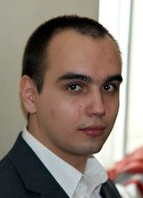
Eugene Pustoshkin
A preface from ILR’s Bureau Chief & Associate Editor in Russia Eugene Pustoshkin:
In December 2012, upon an invitation from Ipraktik (Moscow, Russia) Colin Bigelow (Ken Wilber’s Senior Assistant and member of the Board of Directors at the Integral Institute) and Clint Fuhs (CEO of the Integral Institute and co-founder of Core Integral, Inc.) came to Moscow and led a series of Integral events (which included two open introductory events, one weekend workshop on Integral Spirituality and Non-Dual Practices, and one 4-hour workshop on Integral leadership on December 13-17).
The Russian organizers of this Integral retreat (myself included) asked Ken Wilber to offer a welcoming speech to participants of the Integral movement in Russia which he kindly agreed to do in a form of written statement. We publish the statement below for our readers from around the world, for it has a worldcentric value (also, see this link for a Russian translation of the statement):
Dear Friends,
It is my great honor to write to all of you and say a warm ‘hello’! We are living in very trying and difficult times, and yet times of unparalleled opportunity and optimistic possibilities. In particular, we are facing, for the first time in human history, the emergence of a truly holistic or integral consciousness—meaning a consciousness that is all-inclusive, embracing, caring, pervading, outreaching, enveloping. Never before in humankind’s history has this significant a transformation occurred. All previous transformations—each important, to be sure—were nonetheless partial, fragmented, and excluding—whether magic, mythic, rational, or pluralistic. And yet, starting just a few decades ago, developmentalists began observing the emergence, in rare individuals, of an entirely new type of awareness or new type of consciousness—one that fully appreciated and embraced all earlier stages of development, and did not exclude, marginalize, or attempt to suppress them, but transcended and included them all. Maslow called this self-actualizing; Gebser called it integral-aperspectival; for Loevinger, it was autonomous and integrated; Graves called it systemic. But by whatever name, this consciousness was radically new and altogether revolutionary.
Right now, around the world as a whole, around only 2% of the population is Integral; but this is rapidly expanding, and many developmentalists feel that it might reach 10% within another decade or so. In the meantime, as this new consciousness is starting to emerge around the world, there are those humans who have become aware of this fact, and have come together to form, in various ways, what might be said to be an Integral movement—and that is where all of you come into the picture.
Each of you is here, to participate in various Integral discussions and practices, because you yourselves are at this Integral stage—or, at the very least, have heard of it—and you want to know better how this actually impacts your lives—your work, your relationships, your roles as father or mother or husband or wife or mate, the sustainability of our planet and such things as the climate crisis, your political system, and your spirituality, to name a few.
Russia actually has a history of Integral thinking, and certain of its tenets run deep in Russian blood. There is, for example, the rather extraordinary Vladimir Solovyov (1853-1900), who introduced what he called an ‘integral’ form of knowledge, and made it the basis of discovering the unity between the human and the Divine. His lectures on ‘The Divine Humanity’ in 1878 were a milestone in Russian history, and were attended by many young Russian intellectuals of the time, including Dostoevsky and Tolstoy (Solovyov is thought to be the prototype of both Alyosha and Ivan in The Brothers Karamazov). Solovyov’s followers, such as S. L. Frank and Sergei Bulgakov, furthered early Integral thinking. Deeply embedded in the movement is a desire to understand and experience what Frank called ‘all-unity’ or ‘total unity’—to leave nothing out, to include all. Solovyov particularly saw this as the role of divine Sophia, or Wisdom.
And it is divine Wisdom, by whatever name, that continues to empower Integral movements the world over. The desire is to cease fragmenting the world, stop tearing it into shreds, ripping it into shards, devastating its totality and reducing it to slices and slips, broken tokens and partial silos. For one thing is certain: of all the really wicked problems facing humanity at large in today’s world, none of them can be solved with piecemeal, fragmented, partial approaches. Our approach is, and must increasingly become, Integral—whole and inclusive, systemic and comprehensive, compelling and embracing.
Russia is coming out of some 70 years of communism, and is faced now with building a culture that, in many ways, picks up at orange Reason, reconstructs a healthy and functioning democratic government, overcomes its broken middle class and widespread organized crime, and enters the world stream of commerce and communication free of distortion, domination, and coercion. And this is introducing a greater measure of Freedom not only to society as a whole, but to each and every individual in the culture.
And that is where Integral enters the picture. At the very least, individuals who are aware of the Integral movement (and Integral Theory and Practice) can start to fashion their own lives according to Integral principles. These include:
— always including all 4 quadrants (experience, behavior, cultural, and social) in one’s views and actions.
— trying to be aware always of all of the various levels of worldviews (archaic, magic, mythic, rational, pluralistic, integral, and transpersonal), and how each of those sees the world and wishes to act on it. Integrating these worldviews is a large portion of the Integral approach to various issues.
— including states of consciousness (gross, subtle, causal, witnessing, and nondual) in one’s daily practice, thus working constantly to WAKE UP from the dream of fragmentation, illusion, and suffering.
— being aware of the numerous multiple intelligences (or ‘developmental lines’) that humans possess, and taking those into account when faced with any significant issues, including education, politics, religion, medicine, and law. Where developmental states practice results in WAKING UP, developmental lines practice results in GROWING UP, and both of these are part of a truly Integral life. ‘Line absolutism‘ (absolutizing just one multiple intelligence) is as common as ‘quadrant absolutism’ and ‘level absolutism,’ and all of them contribute to a non-integral, non-holistic, non-embracing approach to issues. They all, in other words, contribute to the fragmentation and brokenness that marks so many of the world’s problems.Many of the aspects of an Integral Approach come from modern and postmodern disciplines; but many also come from the great premodern traditions. In particular, the Integral Approach has identified 5 major reasons an individual isn’t Enlightened or Awakened, based on 5 of the most important of the Great Paths of Self-Liberation (which Colin will be discussing with you: the Madhyamika, the Yogacara, the Dzogchen, the Vedanta, and the Christian). Added to modern and postmodern approaches to growth and development, this gives us a broad-based, truly Integral approach to growth and development and human evolution. This is combined with serious shadow work—or addressing our psychological and psychotherapeutic issues as well, thus not being sabotaged by our own unconscious.
Sound complicated? In a way, it is. But remember, these various dimensions are already present in you, right now, and they are operating whether you know it or not. So your basic choice is whether to be aware of them, or to continue to ignore them—but exist they do, and wisdom would indicate trying to be as conscious of them as possible, and take them all into account, for a truly comprehensive or Integral Approach. And once you get started, you’ll find that it’s not nearly as complicated as it seemed—that it’s actually fairly simple and straightforward, and can be worked on as an Integral Life Practice in a very honest, open, simple, and beneficial way.
So I would like to welcome you to this Integral workshop with some of my top students, who not only know my material inside out but have made their own important and original contributions as well, as you’ll see. I am joining you all in Spirit, and I am sending all of you much love and much light.
With very best wishes,
Ken Wilber
Dec 2012
Integral Institute’s Colin Bigelow & Clint Fuhs in Russia (December 2012)
Dear colleagues, I want to offer you a short summary of the series of Integral events that happened in Moscow, Russia, in December 2012. These events were initiated by Ipraktik, an integrally informed initiative that aims at promoting Ken Wilber’s Integral approach and organizing Integral events in Moscow and other cities of the country. I helped Dmitry Baranov (the founder and main organizer at Ipraktik) and his team in preparing and promoting this project. In particular, the very idea of inviting Colin Bigelow and Clint Fuhs together came to me when I was riding a train from St. Petersburg to Moscow earlier in the Fall. It had emerged as an epiphany and a spiritual understanding that, if that event would happen, it could generate a lasting impact that could benefit not only the relatively few Russians who would personally attend the event but also many people around the world (perhaps, later I would have an opportunity to explain some of the reasons why I think so). I wanted to write an elaborate first-person account about the event (following my experimentations with Integral radical subjectivity), offering my phenomenological glimpses and sharing some of the important realities, but I couldn’t find an angle and muse that would satisfy my passion, therefore I am offering a somewhat distanced short overview of the event instead. Of course, some people would say, “Thank God, no more of that Eugenian nonsense,” and thank me for being briefly straightforward. But I really feel that it is important to share the direct feel and hermeneutics of the event. Perhaps, sometime in the future an occasion would emerge for me to share the phenomenology in a better way. For now, please see the overview and make sure to check out the beautiful photographs. — Eugene Pustoshkin, ILR’s Bureau Chief & Associate Editor for Russia.
In December 2012 Colin Bigelow (Ken Wilber’s Senior Assistant & Integral Institute’s Board of Directors member) and Clint Fuhs (CEO of Integral Institute & Co-Founder of Core Integral) visited Russia. They were invited by an integrally informed team of activists Ipraktik (that organizes Integral events in Moscow, Russia). Previously, Ipraktik had organized Hungarian Integral Academy founder Bence Ganti’s workshop in October.
It was the first time when Colin Bigelow acted in the role of an Integral Spirituality teacher. Colin came to Moscow directly from Spain on December 12. Prior to that he had taught a weekend workshop on Integral Spirituality and “Five Reasons Why You Are Not Enlightened” (the latest Ken Wilber’s teaching) in Madrid. This Spanish event was organized by Raquel Torrent. She coordinated the logistics of Colin’s travel with Ipraktik (she invited Colin to Madrid after she learned that he planned to go to Moscow). This was probably the first instance of international cooperation between Russian and Spanish Integral communities.
On Thursday, December 13, while Clint Fuhs was about to arrive at an airport in Moscow, Colin offered a talk and Q&A session during an open event titled “Ken Wilber, the Kosmic Storyteller.” Colin read Ken’s welcoming letter to Integral Movement in Russia and told about his experience with Ken. He has spent 10 years besides this profound American philosopher and mystic; and he successfully attempted at transmitting the spirit of what it is like being in the presence of such profound depth. This and the following events were hosted by the White Clouds center (“Belie Oblaka” in Russian).
Toward the very end of the Thursday event Clint arrived directly from the airport and was able to participate in the Q&A session (even though he just had a 20-hour flight, he said that by the moment he entered the auditorium his tiredness was completely gone; he apparently entered a state of mental clarity and sharpness). Clint’s presence and voice energized the room even more; many people instantaneously noticed how wonderfully Clint and Colin’s energies complement each other.
The entire Thursday event was openly and freely webcasted for people from various cities in Russia, Europe, and USA. Many Integral folks from Denver and Boulder (who knew Clint and Colin personally) watched the webcast. On the next day Colin shared that Ken watched a bit of the talk, too. This was actually nice to hear, because it brought even more connection to the source of the current wave of Integral thinking and being.
On Friday, December 14, in the afternoon Clint (after being interviewed together with Colin by Vladimir Maikov, a prominent Russian transpersonal psychology activist) gave an open Introduction to AQAL Integral Framework. This introduction was organized in order for people who were not acquainted with Ken Wilber’s philosophy to gain a quick understanding of what was essential to know in order to follow further events.
Then, on Friday night, Clint was joined by Colin, and together they started their main workshop that continued through the weekend. The main topic of this workshop was “Integral Spirituality and Non-Dual Practices.” Participants were introduced to a sophisticated understanding of the Wilber-Combs Lattice, developmental psychology, states of consciousness, and “Five Reasons Why You Are Not Enlightened” (Ken Wilber’s teaching that summarizes the main obstacles to spiritual self-realization based on five important wisdom traditions—Madhyamaka, Yogacara, Dzogchen, Vedanta, and Christianity). They also talked about the notion of Kosmic karma and creativity and responded to questions. Later in the night Clint and Colin paid a visit to the Moscow Integral Club (the oldest currently functioning Integral salon in Russia; it has been gathering every weekend for 5 years) where they met the main participants of this group and discussed a spectrum of issues, including (most notably) politics and (on a somewhat important note) Integral LGBT studies, specifically an Integral approach to transgender. This was a warm and sincere meeting, exploration and encounter.
On the following Monday, December 17, Clint and Colin were interviewed by PSYCHOLOGY 21 cable channel, the only TV channel in Russia that covers the topics of psychology (including transpersonal psychology) and spirituality. Then in the evening Clint led a 4-hour workshop where he introduced the elements of Integral Methodological Pluralism as a tool for Integral leadership, decision making and perspective taking. After that a part of participants, the organizers, and both Clint and Colin went to a Georgian cuisine restaurant and had an “afterparty” there.
Tuesday, December 18, was reserved for leisure, rest and sightseeing. Dmitry Baranov and I showed our American guests the beautiful Moscow subway system (many of the subway stations in the downtown were built in the Soviet period as monumental symbols of communist art). Then we went to the Red Square and the famous Tretyakov State Gallery. In the evening we had a small dinner conversation with Clint; and then I had to return to St. Petersburg by a night train. On the next day, Wednesday, December 19, Clint and Colin had their flight back to USA (Dmitry, our generous host, escorted them to the airport).
It was a beautiful and powerful Integral Event, full of intensity, wisdom, compassion, and non-dual presence. Below we offer a few selected photos made by Valentin Gorbunov, the workshop participant. He generously shared these photographs with us; these images capture the memory of our winter Integral magic.
All photos © Valentin Gorbunov, Dec 2012

Figure 1: The auditorium during Colin Bigelow’s presentation “Ken Wilber, the Kosmic Storyteller”
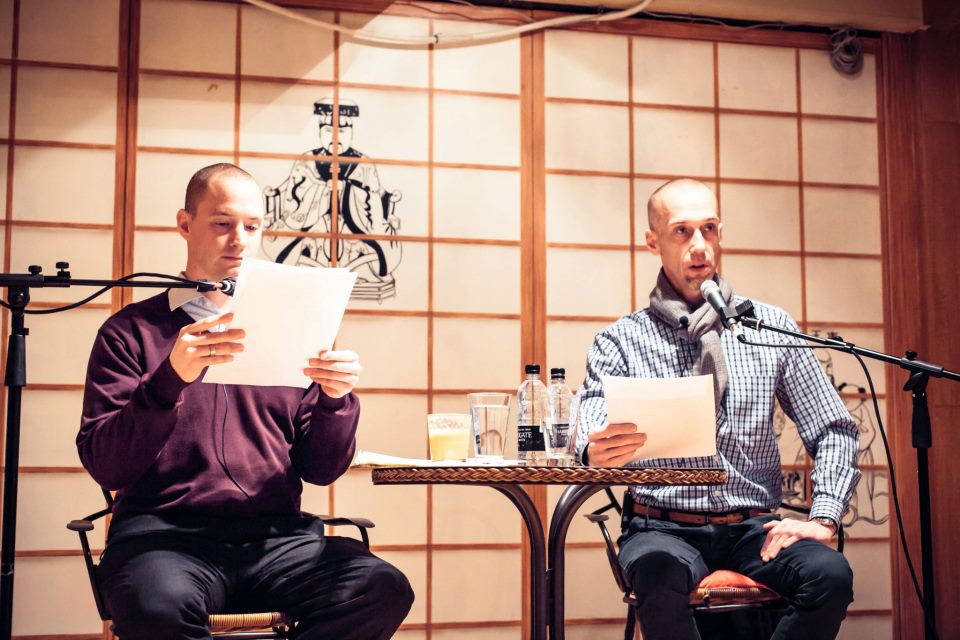
Figure 2: Colin Bigelow (left) is reading Ken Wilber welcoming letter to Russians. Alexander Narinyani (right) is translating it to Russian.

Figure 3: Clint Fuhs and Colin Bigelow leading a workshop together.
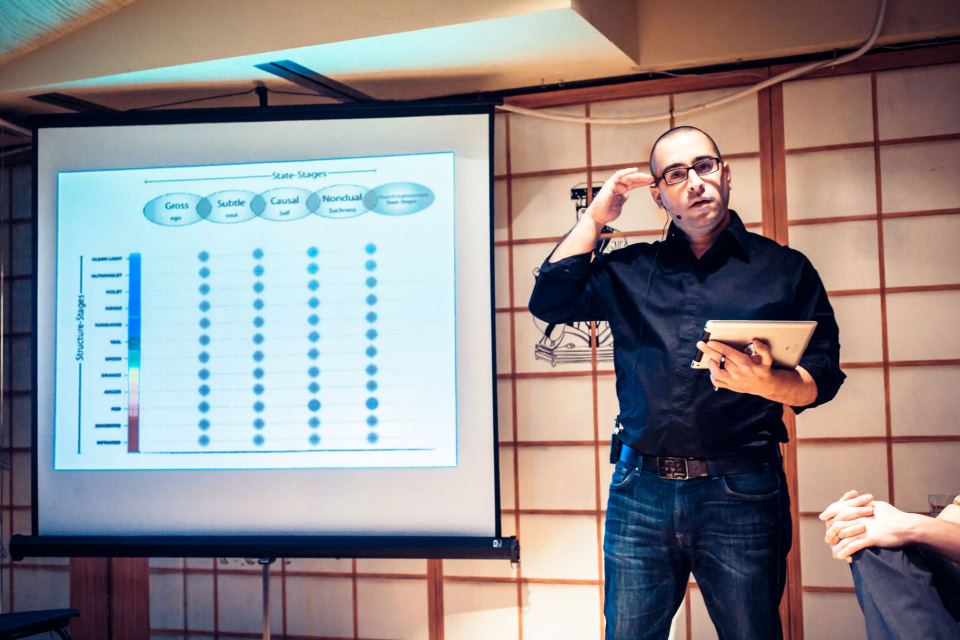
Figure 4: Clint Fuhs speaks on post-metaphysical spirituality, state and stage development, and Wilber-Combs Lattice.
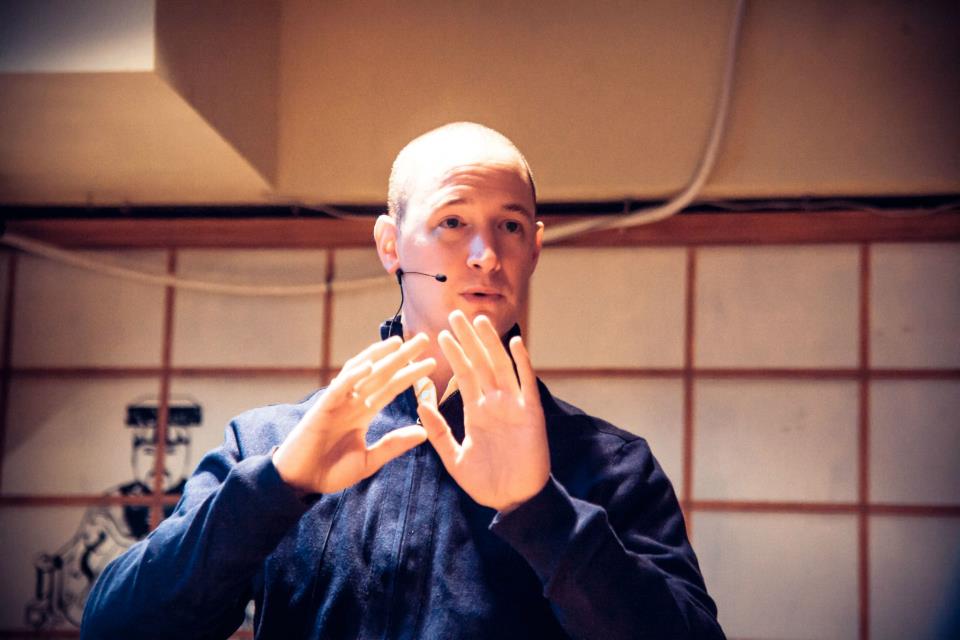
Figure 5: Colin Bigelow shares his presence.
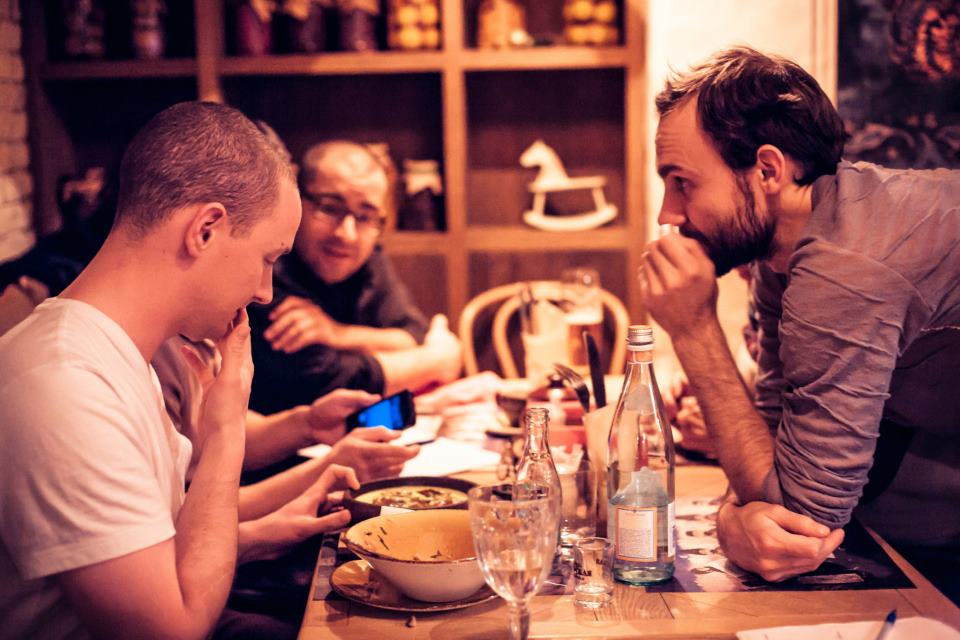
Figure 6: “Afterparty” dinner at a Georgian cuisine restaurant. Colin Bigelow (left), Clint Fuhs (background), Dmitry Baranov (right)
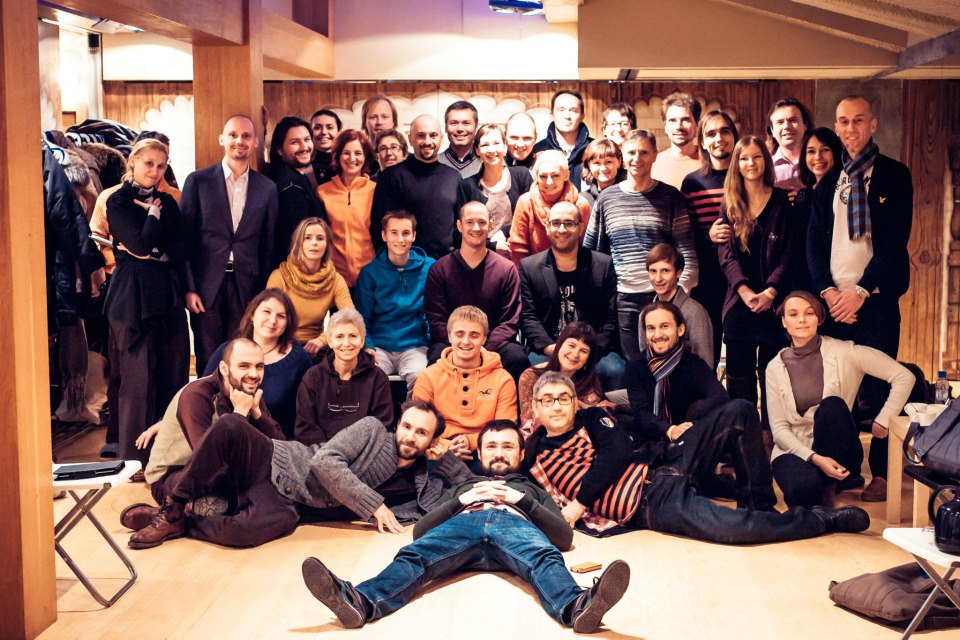
Figure 7: The group photo after the weekend event.
The events were attended by psychologists, psychotherapists, philosophy scientists, artists (including hip hop artists), theatrical and movie actors, spiritual teachers, business leaders and cultural activists.
Other photos are available at Valentin Gorbunov’s Facebook page.
About the Author
Photo © Valentin Gorbunov, Dec 2012
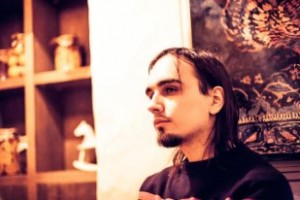
Eugene Pustoshkin – Photo © Valentin Gorbunov, Dec 2012
Eugene Pustoshkin is the Bureau Chief & Associate Editor for Russia at Integral Leadership Review. He graduated as a clinical psychologist from St. Petersburg State University, Russia, in 2010. He co-founded altstates.net, a web project dedicated to promoting academic studies of altered states of consciousness. As a psychologist he maintains a private practice within the framework of Integral psychotherapy and Holoscendence. His interests include integral and transpersonal approaches to individual and social transformation, global citizenship, cross-cultural integration, transdisciplinarity, and networking. One of his main focuses is pragmatic application of Integral Spirituality and Integral Psychology to life and exploration of the unity of tantric and gnostic paths of the world. He can be reached via email eapustoshkin@gmail.com and via Facebook.
